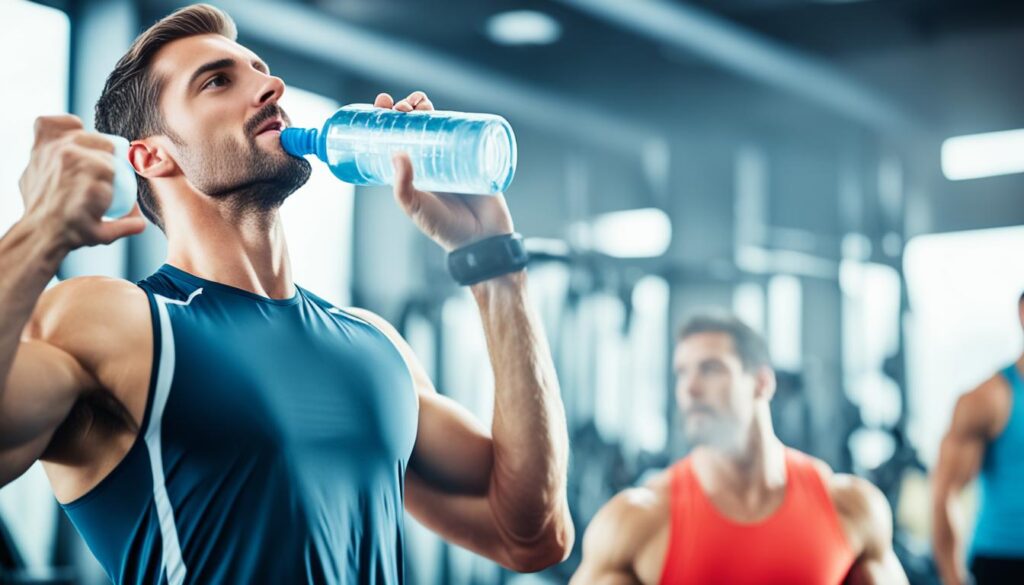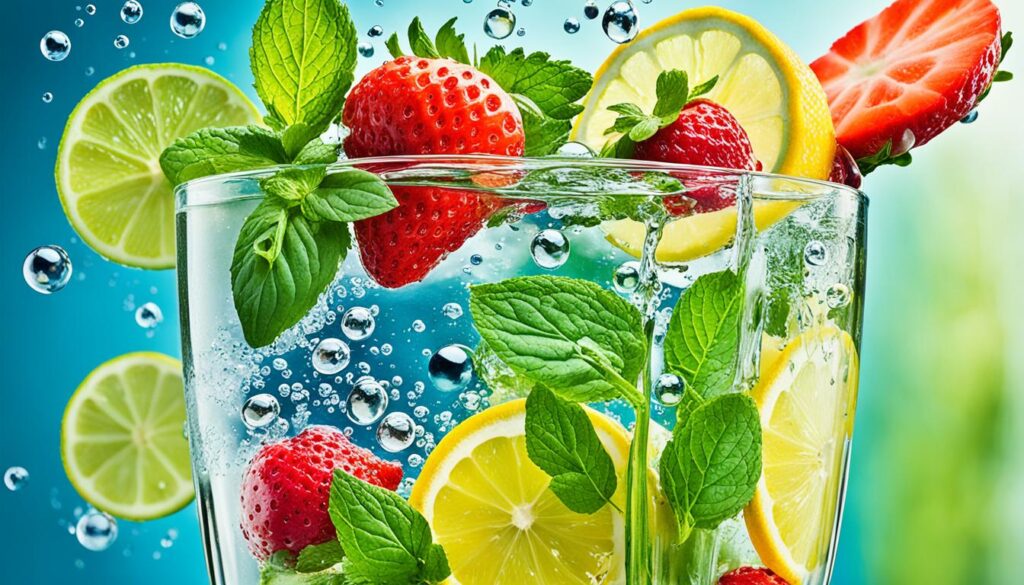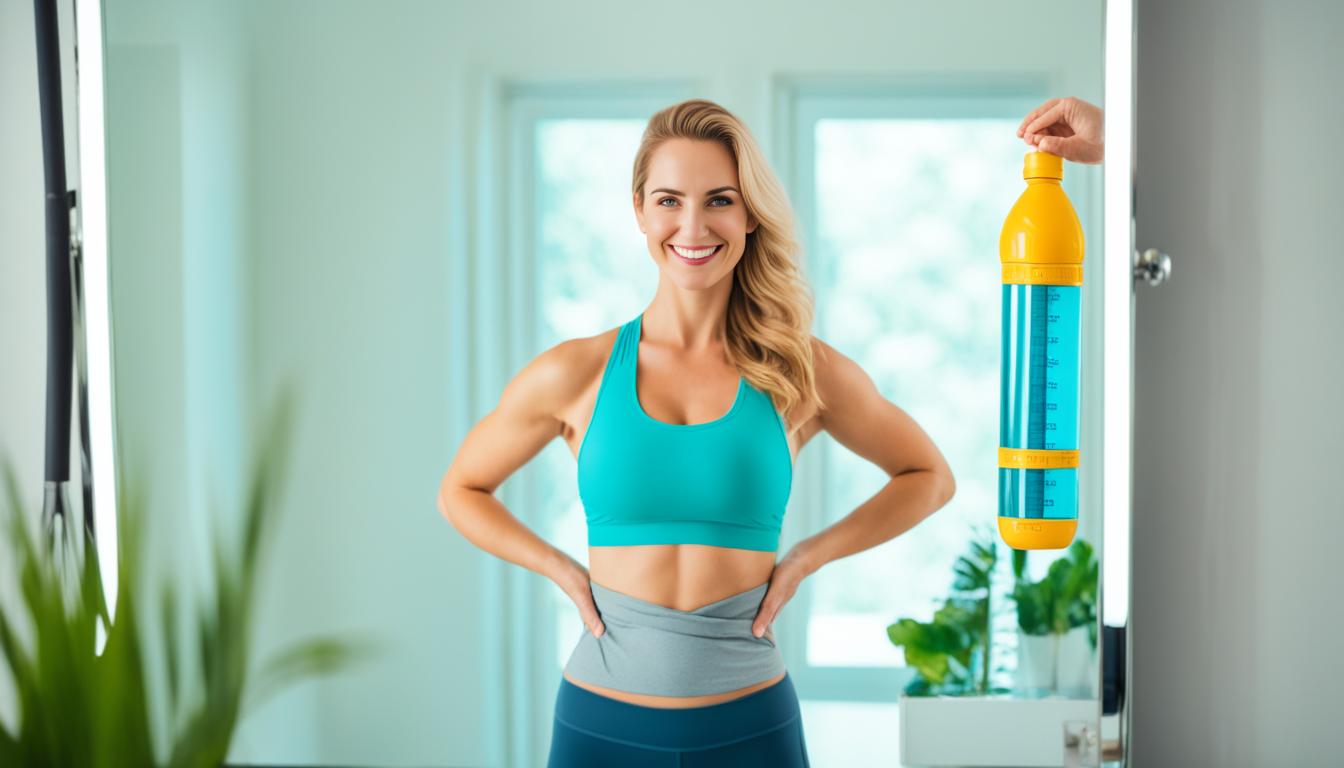Drinking water is critical for good health and can boost your weight loss. A hydration water diet might not cause weight loss directly, but it can help. By choosing water over sugary drinks, you lower your calorie intake. This promotes better hydration for weight loss.
Keeping your water levels right can aid in weight loss. It helps with digestion and keeps your muscles working well. The Academy of Nutrition and Dietetics advises women to drink about 9 cups daily, and men should aim for 13 cups. These hydration tips for dieting keep you on the right path and help your body function well.
Sipping water won’t shed pounds instantly, but it does help manage weight. Since 60% of your body is water, every function needs it to work correctly. Studies show well-hydrated people can think better and burn fat more effectively. Adding water-based weight loss strategies to your plan is easy and works well.
Key Takeaways
- Swapping sugary drinks for water can lower calories and aid in losing weight.
- Good hydration is key for digestion, muscle work, and staying at a healthy weight.
- Women should drink 9 cups of water daily, while men need about 13 cups.
- Well-hydrated bodies perform tasks more efficiently, which supports losing weight.
- Using water-focused methods in your weight loss plan is straightforward and effective.
The Role of Water in Weight Loss
Water is key for weight loss. It speeds up your metabolism, makes you feel less hungry, and helps burn fat. Our bodies are mostly water, so it’s vital for everything to work well. If you’re trying to lose weight, drinking more water can really help.
How Water Supports Metabolism and Fat Burning
Drinking water makes your metabolism work harder, burning more calories. One study showed a big increase in metabolism when people drank cold water. This results in burning extra calories each day, which is great for losing weight.
Also, water is needed to burn fat properly. Drinking more water might boost this process, by helping fat move out of cells easier. Although more studies are needed, keeping hydrated is a plus for overall health and weight control.
Water’s Impact on Appetite and Calorie Intake
Water can make you feel full, helping to eat less and cut calories. Picking water over sugary drinks means you naturally eat fewer calories. This is key for losing weight.
Drinking water before meals can lower how much you eat. A study found it made people eat less, leading to weight loss. Another study with girls showed drinking water before meals alone helped them lose weight.
Choosing water over diet drinks helps more with weight loss in overweight and obese women.
Making water your main drink helps with diet control. Drinking water a lot, especially before eating, is a simple and smart way to help lose weight.
| Water Intake | Effect on Weight Loss |
|---|---|
| Drinking 2 cups of water before meals | 22% reduction in food intake |
| Replacing diet beverages with water | Greater weight reduction in overweight and obese women |
| Drinking 500 mL of cold or room temperature water | 2-3% increase in calorie burning for 90 minutes after drinking |
Adding simple water habits to your day can boost your metabolism, reduce hunger, and burn fat. Remember to drink water often and choose it over other drinks. This will help your weight loss journey and keep you healthy.
Hydration and Weight Management
Staying hydrated is key for your health and helps a lot with weight management. When you’re on a diet, understanding water’s role is vital. Adequate water can help you reach your weight loss goals faster. But, if you are dehydrated, losing weight can be tough. Dehydration might even cause weight gain.

Dehydration’s Effects on Weight Loss Efforts
Being dehydrated can harm your weight loss journey. It stops your body from getting rid of waste properly. Your kidneys need water to filter out bad stuff while keeping the good. If you don’t drink enough, your body holds onto water. This causes you to temporarily gain weight. Dehydration can also lead to constipation and discomfort.
A 2010 study by Thornton SN found that being thirsty can affect your exercise and food choices. This study showed how important staying hydrated is for your health and managing weight.
Optimal Hydration for Weight Control
To stay properly hydrated, drink water when you’re thirsty. Generally, it’s good to aim for 8 glasses of water (about 2 liters) daily. But, your actual needs depend on things like how active you are, your age, and the weather.
| Population | Water Intake Recommendations |
|---|---|
| Sedentary adults | 8 glasses (64 ounces) per day |
| Active adults (exercising regularly) | 10-12 glasses (80-96 ounces) per day |
| Older adults | 6-8 glasses (48-64 ounces) per day |
| Nursing parents | 12-13 glasses (96-104 ounces) per day |
Signs of not drinking enough water include dry skin, dark urine, and tiredness. If these symptoms pop up, drink more water. Keeping well-hydrated boosts your body’s basic functions and helps with losing weight.
“Drinking enough water can aid in weight loss by making you feel full, speeding up metabolism, and helping the body get rid of waste.” – Dr. Amanda Smith, Nutritionist
Following these tips for hydration in your weight loss plan will keep you focused. Remember, being well-hydrated is crucial for a healthy body and steady weight management.
Water-Based Strategies for Calorie Reduction
Water is key for losing weight, not just for staying hydrated. Choosing what you drink carefully can cut down on calories and help you lose weight. Water is a great choice because it has no calories.

Replacing High-Calorie Drinks with Water
Swap high-calorie drinks for water to lower your calorie intake. Sodas, juices, and sweet teas add up to a lot of calories. It’s not just these – sports drinks and alcohol also pack in the calories. By choosing water or unsweetened tea instead, you can help your weight loss.
A 2013 study showed that drinking more water can reduce weight gain. Adding one cup of water a day was linked to lower weight gain. Replacing a sugary drink with water daily helped people avoid gaining weight over four years.
Using Water to Curb Snacking and Overeating
Water can help you eat less by controlling your hunger. Thirst makes us look for food sometimes, even when we’re not truly hungry. Drinking water when you feel like snacking might be all you need.
Driking water before meals can also make you eat less. Studies show that people ate less when they had water before meals. One study found that drinking 2.1 cups of water reduced food intake by 13% in adults with extra weight.
| Strategy | Effect on Weight Loss |
|---|---|
| Replacing one sugary drink with water daily | Reduced weight gain by 0.5 kg (1.1 lb) over four years |
| Drinking 2.1 cups of water 30 minutes before meals | Reduced food intake by 13% compared to not drinking before meals |
Adding more water to your day can really help cut calories and lose weight. Making small changes, including drinking more water, can show big results over time. And besides helping with weight loss, staying hydrated is good for your health overall.
Enhancing Exercise Performance with Proper Hydration
Staying hydrated is key for top exercise performance and reaching weight loss targets. Studies show that being just a bit dehydrated can cut down how well you perform in workouts by 2% or more. It can also lower strength, power, and how well you do in tough workouts by 2-10%. Shockingly, 66% of NCAA Division I athletes started their practices already dehydrated. This shows that not drinking enough water is a big issue for athletes.
For best results, the National Athletic Trainers’ Association says athletes should drink 500 to 600 ml of water or a sports drink 2 to 3 hours before doing any exercise. Then, they should have 200 to 300 ml more 10 to 20 minutes before they start. While exercising, they need to drink 200 to 300 ml every 10 to 20 minutes. This keeps their muscles working and them performing well. How much an athlete sweats can be quite different, from 0.5 to 3.0 L/hr. This shows the importance of everyone drinking the right amount for them when being active.
Hydrating after exercising is just as vital. It helps you recover and be ready for the next workout. Athletes need to replace the fluids they lost and aim to not drop more than 2% of their body weight. Drinking a mix of carbs and protein after a workout can help hold onto fluids. It’s 15% better than drinking just carbs and 40% better than water. By focusing on drinking enough before, during, and after exercise, athletes can do better. This approach also helps them meet their weight loss goals.




